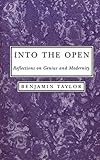Into the Open : Reflections on Genius and Modernity / Benjamin Taylor.
Material type: TextPublisher: New York, NY : New York University Press, [2020]Copyright date: ©1995Description: 1 online resourceContent type:
TextPublisher: New York, NY : New York University Press, [2020]Copyright date: ©1995Description: 1 online resourceContent type: - 9780814782132
- 9780814783320
- 153.9/8 20/eng/20230216
- BF416.A1 T38 1995
- online - DeGruyter
| Item type | Current library | Call number | URL | Status | Notes | Barcode | |
|---|---|---|---|---|---|---|---|
 eBook
eBook
|
Biblioteca "Angelicum" Pont. Univ. S.Tommaso d'Aquino Nuvola online | online - DeGruyter (Browse shelf(Opens below)) | Online access | Not for loan (Accesso limitato) | Accesso per gli utenti autorizzati / Access for authorized users | (dgr)9780814783320 |
restricted access online access with authorization star
http://purl.org/coar/access_right/c_16ec
Into the Open is a philosophical and literary inquiry into the deeper meanings of genius. What precisely do we mean when we describe someone this way? What legacy do we invoke when we apply this term? To address this question, Benjamin Taylor here explores how three great minds-Walter Pater, Paul Valry, and Sigmund Freud-viewed a figure widely considered the first great modern genius, Leonardo da Vinci. For each of these great thinkers, Da Vinci is of central importance because for each the received idea of genius has ceased to be a romantic certitude or sacred truth and has become a problem.Invoking Nietzsche's drastic critique of genius, Taylor assesses the less programmatic and more anxious cases of Pater, Valry, and Freud. Whereas Nietzsche sought for and found an escape from romantic humanism, Pater, Valry, and Freud cannot relinquish the idea of genius and serve as troubled witnesses to the dilemma posed by the notion of genius. A myth of genius has been our way of making good the losses romantic modernity entails, Taylor writes, A myth of genius has existed to affirm that, among human lives, some have sacramental shape; that, among human lives, some put into abeyance the equation between life and loss. Such is the post-theological, post-metaphysical role into which we have compelled our geniuses. They make for us one last claim on the sublime. A shift away from the special pleading that has lately plagued literary studies, Taylor's unfazed humanism reasserts the timeless standards of substantiveness, clarity, and grace.
Mode of access: Internet via World Wide Web.
In English.
Description based on online resource; title from PDF title page (publisher's Web site, viewed 01. Nov 2023)


